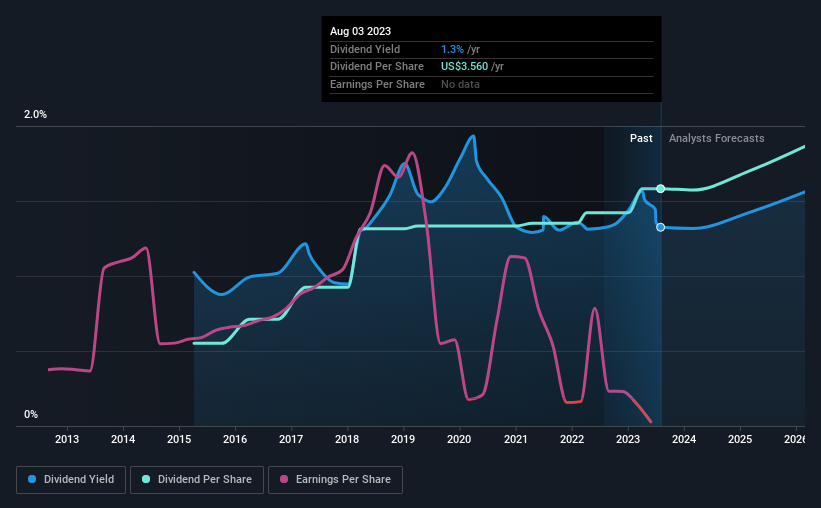Don't Buy Constellation Brands, Inc. (NYSE:STZ) For Its Next Dividend Without Doing These Checks
Some investors rely on dividends for growing their wealth, and if you're one of those dividend sleuths, you might be intrigued to know that Constellation Brands, Inc. (NYSE:STZ) is about to go ex-dividend in just 4 days. The ex-dividend date is one business day before a company's record date, which is the date on which the company determines which shareholders are entitled to receive a dividend. The ex-dividend date is of consequence because whenever a stock is bought or sold, the trade takes at least two business day to settle. Accordingly, Constellation Brands investors that purchase the stock on or after the 9th of August will not receive the dividend, which will be paid on the 24th of August.
The company's next dividend payment will be US$0.89 per share, and in the last 12 months, the company paid a total of US$3.56 per share. Calculating the last year's worth of payments shows that Constellation Brands has a trailing yield of 1.3% on the current share price of $268.73. Dividends are an important source of income to many shareholders, but the health of the business is crucial to maintaining those dividends. So we need to investigate whether Constellation Brands can afford its dividend, and if the dividend could grow.
See our latest analysis for Constellation Brands
Dividends are typically paid out of company income, so if a company pays out more than it earned, its dividend is usually at a higher risk of being cut. Constellation Brands reported a loss after tax last year, which means it's paying a dividend despite being unprofitable. While this might be a one-off event, this is unlikely to be sustainable in the long term. Considering the lack of profitability, we also need to check if the company generated enough cash flow to cover the dividend payment. If cash earnings don't cover the dividend, the company would have to pay dividends out of cash in the bank, or by borrowing money, neither of which is long-term sustainable. It distributed 39% of its free cash flow as dividends, a comfortable payout level for most companies.
Click here to see the company's payout ratio, plus analyst estimates of its future dividends.
Have Earnings And Dividends Been Growing?
Businesses with shrinking earnings are tricky from a dividend perspective. If earnings decline and the company is forced to cut its dividend, investors could watch the value of their investment go up in smoke. Constellation Brands reported a loss last year, and the general trend suggests its earnings have also been declining in recent years, making us wonder if the dividend is at risk.
The main way most investors will assess a company's dividend prospects is by checking the historical rate of dividend growth. Since the start of our data, eight years ago, Constellation Brands has lifted its dividend by approximately 14% a year on average.
Remember, you can always get a snapshot of Constellation Brands's financial health, by checking our visualisation of its financial health, here.
Final Takeaway
Has Constellation Brands got what it takes to maintain its dividend payments? We're a bit uncomfortable with it paying a dividend while being loss-making. However, we note that the dividend was covered by cash flow. It's not the most attractive proposition from a dividend perspective, and we'd probably give this one a miss for now.
So if you're still interested in Constellation Brands despite it's poor dividend qualities, you should be well informed on some of the risks facing this stock. In terms of investment risks, we've identified 2 warning signs with Constellation Brands and understanding them should be part of your investment process.
A common investing mistake is buying the first interesting stock you see. Here you can find a full list of high-yield dividend stocks.
Have feedback on this article? Concerned about the content? Get in touch with us directly. Alternatively, email editorial-team (at) simplywallst.com.
This article by Simply Wall St is general in nature. We provide commentary based on historical data and analyst forecasts only using an unbiased methodology and our articles are not intended to be financial advice. It does not constitute a recommendation to buy or sell any stock, and does not take account of your objectives, or your financial situation. We aim to bring you long-term focused analysis driven by fundamental data. Note that our analysis may not factor in the latest price-sensitive company announcements or qualitative material. Simply Wall St has no position in any stocks mentioned.



